

Untitled. How can I speed up my metabolism to lose weight? It’s not unusual to hear people blame their weight gain on a slow metabolism.
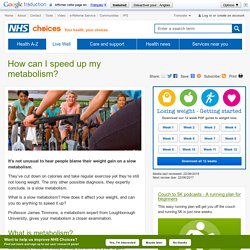
They’ve cut down on calories and take regular exercise yet they’re still not losing weight. The only other possible diagnosis, they expertly conclude, is a slow metabolism. What is a slow metabolism? How does it affect your weight, and can you do anything to speed it up? Professor James Timmons, a metabolism expert from Loughborough University, gives your metabolism a closer examination. What is metabolism? Metabolism describes all the chemical processes that go on continuously inside the body to keep you alive and your organs functioning normally, such as breathing, repairing cells and digesting food. These chemical processes require energy.
Your BMR accounts for anything between 40% and 70% of your body’s daily energy requirements depending on your age and lifestyle. There are many calculators that work out your daily energy needs available online. Do some people have a faster metabolism than others? Rationing of weight management services undermines health efforts. People who are dangerously overweight are being denied vital help because weight management services are being rationed to save money, despite rising obesity, public health experts have revealed.
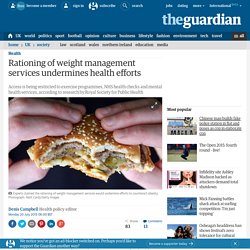
Access is also being restricted to exercise programmes, NHS health checks, mental health services and efforts to help smokers quit, according to new research by the Royal Society for Public Health. In a survey it conducted of 100 public health officials working for the NHS and local councils just under half (49%) said that weight management programmes had been rationed in their area in the last year. Almost as many (44%) had seen restrictions placed on the availability of exercise referral programmes, which help people with diabetes or heart problems adopt healthier lifestyles. Experts claimed the rationing would undermine efforts to counteract expanding waistlines. Health Club Management - Exercise referrals hampered by ‘rationing of public health services’... Some obese and inactive NHS patients are unable to access public health initiatives designed to improve their wellbeing because budget cuts are causing these services to be rationed, according to the Royal Society for Public Health (RSPH).

RSPH survey of public health workers revealed that cuts are having a direct impact on frontline services which are key to combatting Britain’s inactivity crisis such as weight management and exercise referral schemes. “This snapshot suggests that funding cuts are beginning to bite and are having a direct impact on frontline services,” said Shirley Cramer, chief executive of RSPH.
“A strategy which undermines prevention defies logic and is only storing up problems for the future, which will be amplified in terms of cost and impact to our nation’s health.” The RSPH survey found that weight management and exercise referral schemes are the services which health workers have seen most commonly rationed. Obesity: 'Slim chance' of return to normal weight - BBC News. 'Great scandal' of childhood obesity to be top NHS target. Describing general practice as "one of the most demoralised parts of the NHS at the moment", he added: "We need to find a way of empowering general practice and addressing the issues of burnout.
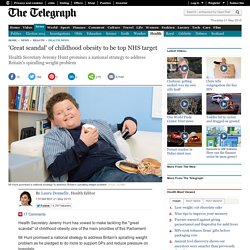
" Referring to Conservative pledges to boost NHS funding by an extra £8bn a year by 2020, Mr Hunt said services remained under "absolutely huge pressures" to make efficiencies. "In part that £8 billion is going to come from other Government departments and we have to understand that there is only so much the NHS can reasonably ask for," he said. He added that "much more detailed discussion" was needed about how the £22 billion in efficiency savings required by NHS England would be found. The Health Secretary said he thought it was important to reflect on the merits of arguments raised by his opponents during the election campaign.
'Great scandal' of childhood obesity to be top NHS target. Children of the 90s more likely to be overweight or obese. Wednesday May 20 2015 More children are getting fatter at a younger age "Children of the 90s are three times as likely to be obese as their parents and grandparents," the Mail Online reports.
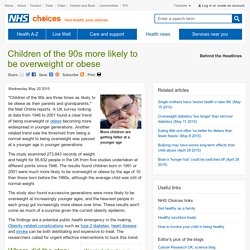
A UK survey looking at data from 1946 to 2001 found a clear trend of being overweight or obese becoming more widespread in younger generations. Another related trend saw the threshold from being a normal weight to being overweight was passed at a younger age in younger generations The study examined 273,843 records of weight and height for 56,632 people in the UK from five studies undertaken at different points since 1946.
The study also found successive generations were more likely to be overweight at increasingly younger ages, and the heaviest people in each group got increasingly more obese over time. The findings are a potential public health emergency in the making. Where did the story come from? It was published in the peer-reviewed journal, PLOS Medicine. 'Two phases' of childhood obesity suggested - BBC News. 'Two phases' of childhood obesity suggested - BBC News. The cynical lie that 'fat is fabulous': why plus size bloggers should never be role models.
Physical inactivity and obesity - don't be fooled. Britain comes 27th in the world's health league. Britain ranks as just 27th best country in the world for health and wellnessObesity levels were the main factor pushing Britain down in health rankingStudy shows UK came 11th in countries with high standards of prosperity By Steve Doughty, Social Affairs Correspondent for the Daily Mail Published: 01:00 GMT, 9 April 2015 | Updated: 14:11 GMT, 9 April 2015 Britain has been ranked only the 27th best country in the world for health and wellness in an international league table looking at a range of living standards.
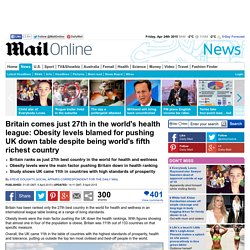
Obesity levels were the main factor pushing the UK down the health rankings. With figures showing that almost one in four of the population is obese, Britain was 111th out of 133 countries on that specific measure. Overall, the UK came 11th in the table of countries with the highest standards of prosperity, health and tolerance, putting us outside the top ten most civilised and best-off people in the world.
For freedom of religion Britain is 50th, and for religious tolerance 80th. Sugar is to blame for obesity epidemic - not couch potato habits. The authors, who include Dr Aseem Malhotra, a cardiologist and adviser to the campaign group Action on Sugar, said the public had been sold a “false perception” that exercise was more important than eating healthily, when the opposite was true.
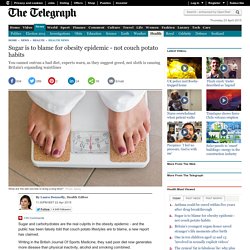
Dr Malhotra said US data which tracked obesity and activity levels found little change in activity levels over two decades, while obesity levels soared. In Britain, 25 per cent of adults are now obese, compared with less than 3 per cent in the 1970s. Very overweight children - advice for parents. GPs should tell their patients to 'go for a walk' Which country is the most unfit (bad news, Britain)?
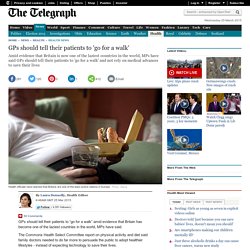
WHO data It came as health watchdogs urged employers to do more to be more active during the working day. The National Institute of Health and Care Excellence (NIce) said workers should be encouraged to stand up during meetings, and advised to walk or cycle to events outside their workplace. The Nice standard on physical activity also says employers should encourage staff to set goals on how far they walk and cycle each day. MPs highlighted a rapid decline in regular exercise in the last two decades, with walking trips decreasing by 30 per cent since 1995, according to official records.
They said family doctors had a “crucial role” in promoting the benefits of regular exercise, even if such advice was sometimes resisted. Experts quoted in the report said exercise was a “miracle cure” which is too often overlooked by GPs, who had “forgotten what it takes to stay healthy”. NHS approach to obesity inexplicable, say MPs - BBC News. MPs say it is "inexplicable" that the NHS in England spends more on bariatric surgery than well-established measures to prevent obesity.
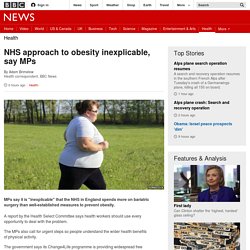
A report by the Health Select Committee says health workers should use every opportunity to deal with the problem. The MPs also call for urgent steps so people understand the wider health benefits of physical activity. The government says its Change4Life programme is providing widespread free advice on healthy eating and exercise. But the MPs argue that national and local government and the NHS must do more to prevent people becoming unwell. That could include regulation of what goes into food, a ban on marketing sugary drinks to children, and much more support for people at risk of obesity and diabetes, so they do not need bariatric surgery. The report emphasises the "huge health benefits" of physical activity. The MPs also highlight inequalities in rates of physical activity, in particular the disparity between men and women. NHS approach to obesity inexplicable, say MPs - BBC News. ? Largest genome-wide study reveals genes driving obesity.
In obesity, some people store fat evenly throughout the body while others store fat around the abdomen.
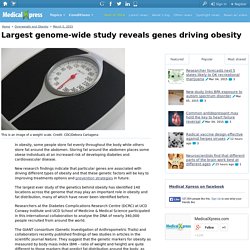
Storing fat around the abdomen places some obese individuals at an increased risk of developing diabetes and cardiovascular disease. New research findings indicate that particular genes are associated with driving different types of obesity and that these genetic factors will be key to improving treatments options and prevention strategies in future. The largest ever study of the genetics behind obesity has identified 140 locations across the genome that may play an important role in obesity and fat distribution, many of which have never been identified before.
Researchers at the Diabetes Complications Research Centre (DCRC) at UCD Conway Institute and UCD School of Medicine & Medical Science participated in this international collaboration to analyse the DNA of nearly 340,000 people recruited from around the world. Tomorrow's mothers 'need obesity help' 16 February 2015Last updated at 22:58 ET A major European obesity investigation has called for urgent action to prevent obesity in women of child-bearing age. The authors, including a team from Edinburgh University, say children born to overweight mothers are at greater risk of health problems in later life. Beyond Diet and Exercise. Image: FredFroese/iStock There are many reasons why people gain different amounts of weight and why fat becomes stored in different parts of the body. Researchers have now conducted the largest study of genetic variation to date to home in on genetic reasons. Their findings were published Feb. 12, 2015, in companion papers—genome-wide association studies—in the journal Nature.
By analyzing genetic samples from more than 300,000 individuals to study obesity and body fat distribution, researchers in the international Genetic Investigation of ANthropometric Traits (GIANT) Consortium completed the largest study of genetic variation to date and found over 140 locations across the genome that play roles in various obesity traits. Get more HMS news here. By applying novel computational methods to the genetic results, they discovered new biological pathways that are important in controlling body weight and fat distribution. David Cameron calls on obese to accept help or risk losing benefits.
People who cannot work because they are overweight or suffering addiction problems could be threatened with losing their sickness benefits if they do not accept treatment under plans due to be outlined by David Cameron on Saturday. Under proposals that are likely to be met with resistance from charities and some medics, the Conservatives will consider whether to reduce payments worth about £100 a week for those they consider could do more to help themselves by going on medical programmes designed to make them to lose weight, stop taking drugs or give up alcohol. The prime minister has asked Prof Dame Carol Black, an adviser to the Department of Health, to examine whether it is appropriate to withhold benefits from those who refuse assistance. It comes in a week when the Tories have been criticised for failing to deal with tax avoidance for the richest while cutting benefits for the poorest.
Parents' lifestyle, rather than genes, causes children to become overweight, study finds Exercise and diet 'not enough to lose weight' There's 'no point' telling obese people to exercise more, doctors claim - Health News - Health & Families - The Independent. In a staunch rebuttal to commentators who argue obese people have brought the problem on themselves and should rely only on diet and exercise, experts from leading American universities said that, even after actively losing weight, biological mechanisms kick in that make it extremely difficult for previously obese people to stay a healthy weight. Fat map: largest genetic blueprint of obesity revealed. 11 February 2015Last updated at 13:03 ET. Free NHS weight loss plan - Getting started. Use the panel above to download the NHS weight loss guide, our popular free 12-week diet and exercise plan.
The plan, which has been downloaded more than 2 million times, is designed to help you lose weight safely – and keep it off. Weight loss plan features. Primary care-based exercise program improves physical activity in obese, middle-aged women. Getting help from the family doctor may be a better way for overweight, middle-aged women to increase their physical activity, rather than trying to go it alone, according to a trial led by researchers at the University of Pittsburgh School of Medicine and funded by the National Institutes of Health (NIH). Obesity and physical inactivity are significant risk factors for cardiovascular disease in middle-aged women. The results, available online in the February issue of the Journal of General Internal Medicine, show that obese, middle-aged women who participated in an exercise program based at their primary care doctor's office were more likely to continue to exercise over several months compared with those who were self-guided.
The Healthy Bodies Healthy Hearts investigators enrolled 99 inactive, overweight women ages 45 through 65 at three UPMC primary care offices at UPMC Montefiore, UPMC Shadyside and Magee-Womens Hospital of UPMC. Source: Working together with families to tackle obesity by Rachel Wareham. We know that individuals, communities, educational establishments and health services all have a role to play in tackling obesity, and because of recent steps, while we have seen rates of obesity level off more, there is no room for complacency. England’s action on obesity. Commenting on the Organisation for Economic Co-operation and Development’s data in its latest Health At A Glance Europe 2014 report, which shows 24.7 per cent of British adults are obese compared with an average of 16.7 per cent in the rest of Europe, Simon Stevens, the Chief Executive of NHS England, said: “The ghost of Christmases past reminds us that 20 years ago we didn’t have these problems as a nation.
The ghost of Christmases future tells us that if we get our act together – as the NHS, as parents, as schools, the food industry – we can get back in shape. Medical reasons for weight gain. Most people put on weight because they eat and drink more calories than they burn through everyday movement and body functions. Mick Cornett: How an obese town lost a million pounds. Find data. Public Health England Obesity Knowledge and Intelligence team. This series of factsheets (previously known as Key Data Briefings) compiles up-to-date key information and data about obesity and its determinants in an easily readable format. The data factsheets will be a useful resource for policy makers, practitioners and anyone with an interest in obesity.
They will be updated regularly. Obesity 'costing same as smoking' Obesity bigger cost for Britain than war and terror. One in ten children are obese when they start primary school. We’ve hit peak obesity, but tough measures still needed to tackle waistlines. Hacking childhood obesity: Can advertising save the world?
Obese lose up to eight years of life. Obesity will take eight years off your life, study says - Health News - Health & Families. Doctors told to report patients who put on weight - Telegraph. Overweight and obesity continues to increase in Europe. Doctors told to report patients who put on weight. Overweight children - advice for parents. Obesity 'could be a disability' - EU courts rule. New Canadian guideline to help prevent, manage adult obesity. 'Obesity time-bomb' driving up healthcare costs. Child obesity rates 'levelling off' among under-10s.
Over a third of children in England overweight. Generation fat? Third of English kids overweight or obese – study — RT UK.